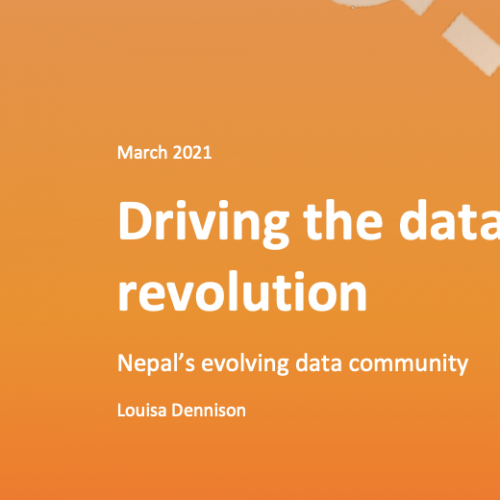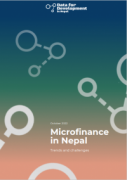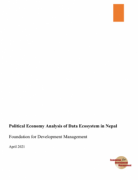
Report – Nepal’s Evolving Data Community
March 23, 2021
Nepal’s data landscape
March 23, 2021How can Nepal’s data community drive the data revolution?
Lessons and approaches for how Nepal’s government, private sector and civil society answer data need caused by inequality, federalisation and Covid-19
The new Development Initiatives report Driving the data revolution: Nepal’s evolving data community looks at the recent progress achieved by Nepal’s data community to understand the important lessons and approaches that can guide future progress.
In recent months, the global Covid-19 pandemic has resulted in a wide range of urgent new data needs in Nepal. The pandemic response has required that government, private sector and civil society actors collect new data, address new questions and manage new concerns around data accuracy, comparability and protection. This, in combination with the need to respond to the increasing threat of climate change, a growing focus on private sector development and continued high levels of economic and social inequality, means that the need for data has never been greater.
However, the key change impacting data needs has been Nepal’s administrative evolution from a unitary state to a federal structure . Nepal’s 2015 constitution created seven provincial and 753 local governments. While federalism in Nepal brings decision-making closer to local communities, we must ask ourselves whether successful implementation can happen without core investment in the sub-national data ecosystems that support local governance. Without access to data-driven evidence, how will citizens, civil society, media and the private sector meaningfully participate in the development of local policies, and how will they hold their locally elected leaders to account?
There is an important role for the data community in responding to this need. Over the past few years, this community of organisations has grown in number, maturity and ambition, and has spurred important advancements in data sharing and use. These achievements include increased data sharing, a growth in the demand for data among government, civil society and the private sector, and a significant growth in the open data movement. To further strengthen the data ecosystem in Nepal so that it can meet the demands of the new federal structure and support a growing culture of data use, it is critical that these advances are built upon and sustained, and particularly that subnational data ecosystems are invested in.
The government of Nepal, the private sector and civil society have an integral role to play in this, as do development partners. The existence since 2018 of the Development Partners Statistical Coordination Group[i] demonstrates the growth in interest from donors in funding activities aimed at supporting data production, sharing and use, and the recognition of the need for increased collaboration among agencies to ensure coordination of their funding.
Importantly, local organisations need to be supported so that they can drive the data agenda, and donor programmes need to respond to this need. This approach has been successfully adopted by initiatives such as the Data for Development programme, which has recognised the critical role that the data community can play in facilitating genuine ownership, leadership and sustainability of data initiatives by government bodies.
To further its reach, the data community needs to grow in number with synergies built between members’ efforts. While supporting pioneers and champions is a start, efforts to strengthen the data ecosystem need to focus on building a holistic, interactive system of data publishers, technical intermediaries, data advocates and data users to avoid creating power imbalances and concentrating opportunities among the few. It is critical for the data community to ensure that it remains connected to grassroots communities, so that it can represent their needs and avoid data becoming an agenda that is captured by elites without public backing.
As the data community evolves its efforts to build demand for data, improve data sharing and strengthen capacities to use data, important new areas for them to address include:
- Supporting the availability of disaggregated data and analysis (potentially via a focus on administrative data) and improving interoperability of data systems and standardisation. This will enable the use of subnational evidence by improving the coordination among federal, provincial and local governments and non-government actors in data and statistics production.[ii]
- Bringing transparency to government decision-making processes and enabling participation through engaging communities and supporting their use of data. Including marginalised groups, such as those who are impacted by the digital divide, will be an important part of this.
- Strengthening policy and governance frameworks to challenge the regulatory uncertainty that is preventing data sharing and re-use. Alongside this, supporting the development of sustainable institutional structures (such as data stewards[iii] and cross-agency open data initiatives) to enable the re-use of data.
- Encouraging data responsibility by designing data protection measures into all data initiatives and development of technologies (e.g. security, access control and privacy-preserving technologies) that can support it. In addition to preserving data rights and personal privacy, this should include management of risks from bias in the analysis and use of data.
- Deepening the focus on the sharing and use of private sector data. Data from government, academia and civil society will not be enough to fill all data gaps, and businesses stand to gain dramatically from the improved use of their own data. New operational and governance models can be developed to support the harnessing of value from private sector data.
There is an important role for donor programmes and collaborative networks to empower, coordinate, facilitate and build the data community’s capacity, sustainability and impact. Politically informed, flexible and adaptive approaches need to be supported to harness the evolving levers of change as Nepal’s federal structure matures. A huge amount of progress on data sharing and use has taken place in Nepal over the past decade, and with the right support the data community will be well positioned to lead the next decade of progress.
The report ‘Driving the data revolution: Nepal’s evolving data community’ has been produced as part of the Data for Development programme in Nepal, which is being implemented by the Asia Foundation in partnership with Development Initiatives, with support from UK Aid.
[i] The Development Partners Statistics Coordination Group brings together development partners with an interest in supporting the Central Bureau of Statistics and the wider national statistical system to ensure activities are as coherent and coordinated as possible.
[ii] Development Initiatives, 2021. Data Landscape of Nepal – Diagnostic and Action Plan. Available at: Diagnostic of Nepal’s data landscape and Towards Federal Statistics; D4D Nepal Strategic Action Plan.
[iii] As described in: Gov Lab, 2020. Wanted: Data Stewards. Available at: https://www.thegovlab.org/static/files/publications/wanted-data-stewards.pdf




